[Video] Professor Yasheng Huang: Trump’s America is in chaos, but is China’s world in order?
Professor Yasheng Huang, Professor of Global Economics and Management at the MIT Sloan School, speaks with ThinkChina editor Chow Yian Ping in a wide-ranging interview, covering topics including global instability, the results of the US elections and China’s political system. The following is an edited transcript of part one of the interview. Part two of this interview will be published after the inaugural ThinkChina Forum.
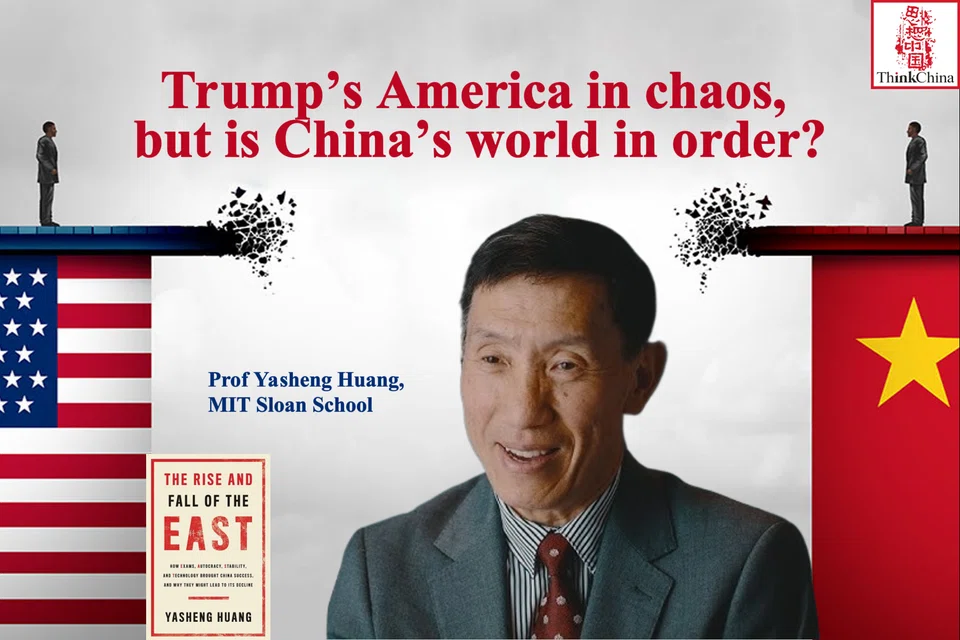
On one side of the globe, newly elected US President Donald Trump aims to make America great again, while on the other, Chinese President Xi Jinping foresees the rise of the East against a declining West. Both leaders face domestic challenges and foreign relations issues. In this era of disruptions and unpredictability, who is better positioned to lead the future world order? What could derail China’s current development trajectory?
The ThinkChina team travels to Boston to speak with Professor Yasheng Huang, Professor of Global Economics and Management at the MIT Sloan School, to gain his insights. Professor Huang is also the author of The Rise and Fall of the EAST: How Exams, Autocracy, Stability, and Technology Brought China Success, and Why They Might Lead to Its Decline.
Nobody has a clue what Trump is trying to achieve
Chow Yian Ping (Chow): Thank you Prof Huang for this interview with ThinkChina. I want to start with President Trump. His return to the White House with his very blunt and unpredictable style...he has sparked global concern and debate. But even though China is the US’s biggest strategic competitor, it doesn’t seem to be Trump’s main focus at the start of his second term. Instead, he has focused on neighbouring countries and allies. But of course others say these moves are really about setting the stage to contain China. So I want to ask you, how do you think Trump’s second term will impact this key relationship? Are we headed for more tension and confrontation? Or is there a chance for cooperation or making a bigger and better deal?
Yasheng Huang (Huang): The honest answer is: We don’t know. And the honest answer is: Nobody knows. But I don’t think that the things that he’s doing now, for example tariffs, Canada tariffs… Mexico, Greenland, and the negotiation with Russia, I don’t see those as chess moves in a larger geopolitical game designed to contain China. Undermining allies, such as Canada and European countries, is going to lead to the surging power of China, rather than containment of China. So I don’t really see the logic in what he’s doing if the objective in the long run is to contain China. I just don’t see that as necessarily the most important policy objective of the Trump administration 2.0.
Chow: Ok, so you don’t see an overarching plan in whatever that he has been doing over this time.
Huang: I saw an overarching plan, strategy under Biden. I just don’t see it under Trump 2.0. Also, I don’t really see a grand strategy to improve the relationship with China. I don’t see a grand strategy to contain China. I don’t see a grand strategy to improve the relationship with China. So we just don’t know where he’s going to lead the foreign policy towards China in the future.
... what he cares about is scoring some superficial short wins so he can brag about his accomplishments.
Chow: I see. So what do you think he’s trying to achieve here? Because, you know, we see so many different policies coming out from the Trump administration every day.
Huang: I think what he cares about is scoring some superficial short wins so he can brag about his accomplishments. For example, to get Russia and to settle Ukraine, at the expense of Ukraine. He will declare that as a win for him, and then he can talk about how he has achieved peace in Ukraine, even though he would do it at the expense and sacrifice of Ukraine. With Mexico, and Canada, he was going to impose a 25% tariff on Mexican goods, on Canadian goods, and then they quickly reached an agreement to suspend these tariffs, the plan to impose tariffs. And he declared that as a win, even though he won nothing. And because all the concessions made by Mexico and Canada, they made those concessions a long time ago, long before this tariff plan. I think that’s what he cares about. He cares about basically how his voters view him, as scoring a win.
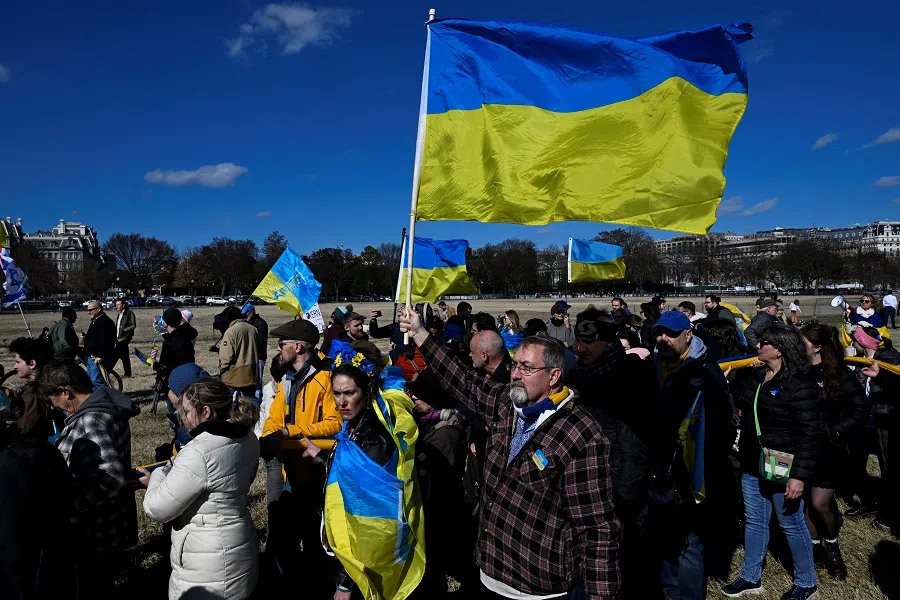
Chow: I see. So, I mean, we also see commentators saying that he’s abandoning the post-World War II world order, which was led by the US and along with alliances across the globe. And we used to say — the West used to say — that China is revisionist. But it seems that the US, whatever it’s doing now, is actually in a way more revisionist than China.
Huang: Yeah. So there’s always a debate — whether or not China intends to challenge the global order established by the United States since the Second World War. There’s always a debate whether or not China intends to do this or not. We don’t know, right? Because in the Chinese political system, only one person knows the answer. What we do know for sure, is that the global system that was set up on the economic side — the United Nations, World Bank, IMF, World Health Organization — and then on the political side — NATO and other organisations — are designed to maintain peace and stability, to prevent challenge from a power that is ambitious, that wants to invade other countries. And it has worked brilliantly since the end of the Second World War. Trump is breaking up that alliance. On the economic side, he is using tariffs as a weapon of mass destruction, violating the WTO rules and the norms. He is imposing tariffs on lots of other countries, reducing the trade volume, reducing global economic activities. On the political side, he’s withdrawing from the WHO. He’s withdrawing from the Paris Agreement. And now, he is openly threatening to undermine the NATO system.
Uncertainty and long-term changes
Huang: So essentially if you look at what he has done or what he intends to do, he’s undermining the economic global order, he’s undermining the political global order. We are going to head into a very, very uncertain period.
Chow: Do you see this as temporary shifts? Or do you see them as long-term fundamental changes that’s going to happen to the US and then to the whole world?
Huang: So I do see this as a long-term change. Because once the damage is done, it is difficult to reverse the damage. If the NATO alliance is broken, even (if) in four years’ time we have a new president, it is going to take time to repair the damage. And in terms of the economic side, economic globalisation — once the factories, supply chains have been readjusted under this new economic environment, it is impossible to reverse these de-globalisation activities that have taken place. It is not going to be so easy to reverse and restore the global economic order. So I do see this as a longer-term change, rather than just a short-term change.
So the Americans are going to be very busy, preoccupied with these issues, rather than issues about global politics and global economics.
Chow: And you do not think that the different forces in (the) US, the different voices that’s coming out against what he’s doing, you don’t think these are going to work in reining in what he’s doing?
Huang: Definitely not. The reason is that these global changes are not on the priority list of American voters. Many of them don’t really know that this is happening. Many of them don’t really understand the value of the global economic order and the value of the global national security order that was established after the end of the Second World War. And on the other hand, on the domestic front, he is threatening to undermine almost some of the basic core principles of American democracy.
If the voters and the Democratic party are going to rally against the Trump administration, they are not going to pick global issues. They are going to pick these domestic issues. So Trump has this strategy, which is known as “flooding the zone”. You create disruptions and changes simultaneously across so many areas, it is very difficult for the opposition party and for the public to really rally against you because there are so many issues that you have to deal with. He has dismantled the USAID, on the global side. And now he’s threatening to really undermine the rule of law and basic democracy. So the Americans are going to be very busy, preoccupied with these issues, rather than issues about global politics and global economics.
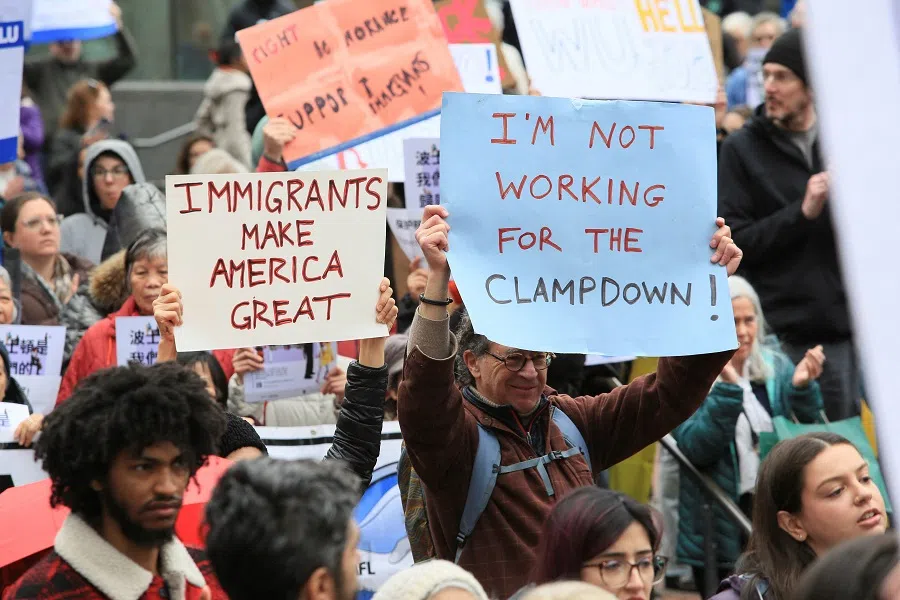
Huang: So one way these global changes may provoke stronger reactions is that these global changes are going to bring about higher prices and inflation and economic difficulties for America. If you impose tariffs on the rest of the world, if you undermine the independence of the Federal Reserve, and if you truly undermine the rule of law, the capital market is going to have very negative reactions, the prices are going to go up. So those reactions and the effects may energise the opposition to the Trump administration. So that’s one way that the global changes can affect the opposition to the Trump administration. But in terms of Ukraine, I just don’t see how that translates into a strong domestic reaction.
The source of Trump’s power
Chow: From what you’ve just said, it sounds like quite a disaster to Americans and the world. So I’m just very perplexed. Why is it pushing in this direction then? You can see the results of it, right?
We are dealing with a bloc of supporters who are so poorly educated and so ignorant about politics, about the economy, about global affairs. And it’s very difficult to fight against ignorance.
Huang: As we keep saying, elections have consequences. And I was strongly opposed to Trump in 2016, in 2020, and in 2024. But the people on my side of the argument clearly lost badly in 2024. So if you look at the data, he won more support as compared with 2020 across different age groups, across different ethnic groups, across different professions, and across different educational levels. That gave him the confidence that he had the political mandate to make the changes that he wanted to make. He has that confidence in part because he won the election, but also because many of his supporters are not among the most educated people in America. They really don’t understand what he’s doing. They don’t understand that his policies are fundamentally against their own interests. So that poor understanding, that ignorance, gave him power. Because the voters who voted for him had no idea that, first of all, he was going to do this, and secondly, the kind of the things that he was going to do were so detrimental to their economic and social interests. So that’s the problem that we have. We are dealing with a bloc of supporters who are so poorly educated and so ignorant about politics, about the economy, about global affairs. And it’s very difficult to fight against ignorance.
So my prediction is that essentially for the people who are not very well educated, who are ignorant about these issues, the only thing that can change their mind is harm. Recession, high inflation, collapse of the capital market. That’s the only way they can learn the lesson — oh, maybe supporting him is not such a good idea. Whereas those of us who use our brain, who can use our analysis to say, yeah, those things that he wants to do are going to be bad for the economy, are going to be bad for America. So this is where we are. And unfortunately, it has happened so many times in history — bad things have to happen to change the minds of the people, especially the people who are less educated and who are ignorant about policy, economy and politics.
I would divide the Chinese supporters of Trump into two kinds. One is the smart kind, and the other is the dumb kind.
Trump’s Chinese and Chinese American supporters
Chow: But very interestingly, on the internet you can actually see quite a lot of Chinese netizens from mainland China; they are actually very supportive of Trump.
Huang: So there are different kinds of Chinese supporters. I would divide the Chinese supporters of Trump into two kinds. One is the smart kind, and the other is the dumb kind. The smart kind are those people who see Trump as undermining America, and therefore it is good for autocratic countries, such as Russia and China. I think they are absolutely right. They supported Trump for the right reason. The dumb kind are those people who supported Trump out of prejudice. And many of them, Chinese Americans living in the United States, are fairly racist. They look down upon Blacks, Mexicans. So Trump’s racial rhetoric resonates with these people. What they don’t quite understand is that your interests, in fact, align with those people that Trump wants to marginalise. Because we live in this country where there are racial minorities, and Trump is not going to just single out Mexicans and Blacks. He has an anti-immigration agenda, and that agenda is going to apply across the board to the immigrants. A lot of these Chinese Americans are immigrants. Sooner or later, it’s going to affect them.

The other group of Chinese Americans who supported Trump are professionals. Some of them work in research institutions. Now Trump is cutting research spending, closing down NIH – National Institutes of Health — (the) CDC. There are many, many Chinese who work in those institutions. There are many, many Chinese who depend on the support of the federal government, in terms of research grants. It’s not so much subsidies, because those are supporting people on a lower socioeconomic level. But many Chinese depend on the federal government. And yet they don’t even have the foggiest idea — voting for Trump, who campaigned on an agenda against the federal government, somehow voting for him was incompatible with their interests. Now they’re finding out. Many of these Chinese Americans are finding out.
Even for the rich Chinese Americans, they think that Trump is good for the economy. It’s absolutely wrong! Trump has been tremendously bad for the economy! He has increased the trade deficit. His mismanagement of Covid-19 was extraordinarily costly for the American economy, in terms of excess debt, in terms of economic activities, and in terms of the stock market. So if you look at the stock market, the stock market rebound happened during the Biden administration. So these are the people who are very well-educated, but for one reason or the other, they have no idea about the complexities of the economics and complexities of American politics. They’re going to regret the choices that they made in 2024.
China entering one of its most uncertain and perilous periods
Chow: I can see your frustration there. I would like to shift our focus onto your book, The Rise and Fall of the East, and also on China. Now, in your book, you have actually, right at the very beginning of the book, stated, and I’m going to quote here: “I believe China is entering into one of its most uncertain and perilous periods.” The book was published in 2023. I want to find out if you still hold that view now.
And the evidence so far is that these technological accomplishments have (not) yet translated into tangible economic gains for the Chinese people. And they have not translated into gains of productivity.
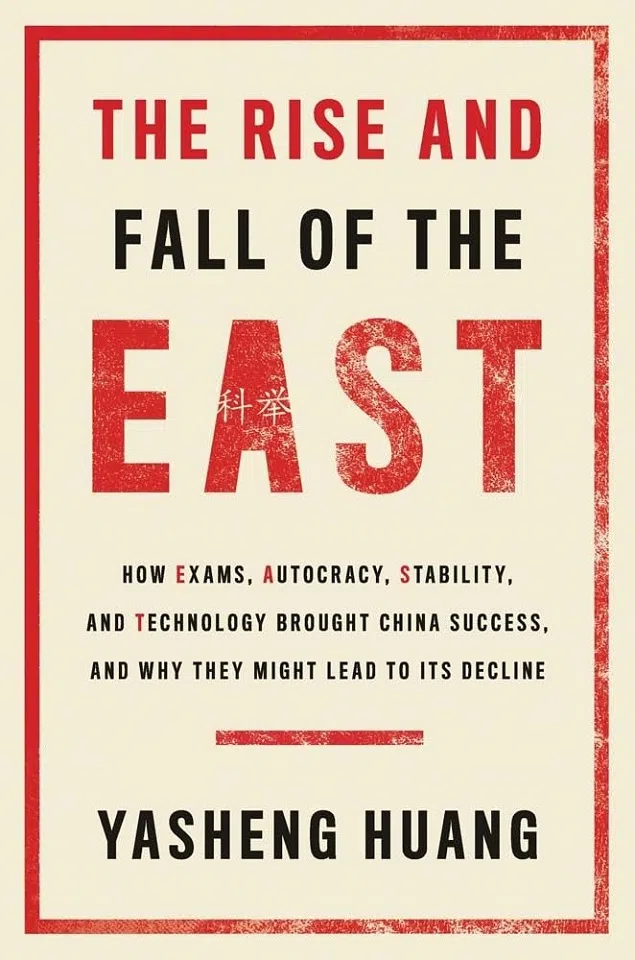
Huang: Yeah. So what is interesting about China today is that it is a country that is now gaining prominence in technology — DeepSeek, EVs, and other technologies. Simultaneously, the Chinese economy is at its weakest moment in the last 40 years. So it was the economic aspects I was referring to. And I’m not going to minimise the technological accomplishments that China has created and has made tremendous progress in. But fundamentally, a country needs economic growth. And especially for China, which is the second largest GDP in the world. But on the other hand, it has 1.4 billion people. On a per capita basis, China today is still a middle income country, rather than a rich country such as Singapore, such as the United States. So the priority for a country that is still middle income is to continue to grow GDP and the economy in order to improve the livelihood of the 1.4 billion people. It is actually not technology, it is not EVs, it is not DeepSeek, even though these are very impressive accomplishments.
And the evidence so far is that these technological accomplishments have (not) yet translated into tangible economic gains for the Chinese people. And they have not translated into gains in productivity. In fact, if you look at the data very carefully, Chinese successes in infrastructure and technology — those successes have been accompanied by productivity slowdown and stagnation. So it is very puzzling when the country is improving its technology, the productivity performance is actually getting worse. And therefore the technology contribution to economic growth is not very strong, and arguably can be negative. So this is the situation that China is in. You know, we are holding this conversation on Thursday. On Monday, there was a high-level meeting between Chinese private entrepreneurs and Xi Jinping. Jack Ma was there.
So one of the key factors why I expressed my concern about (the) Chinese economy in 2023 was the state of the private sector in the Chinese economy. We know very well that the true growth driver in the past 40 years came from the private sector. When you crack down on the private sector — in 2020, 2021 — that was going to have a huge negative effect on the psychology of the consumers, the psychology of the entrepreneurs. I think that meeting on Monday was symbolically significant. Economically whether it is significant we can have a debate, but symbolically significant. There was a picture of Jack Ma shaking hands with Xi Jinping, and it was an indirect signal that the Chinese government has revised its policy toward the private sector, which I think is a good sign. It’s a good direction to go. But I just don’t think it’s significant. I just don’t think that after so much damage, a simple meeting can be sufficient to jumpstart economic growth.
So I predict that economic growth is not going to become strong for quite some period of time, and there are going to be tensions in society. And there are going to be unemployment pressures, especially now with the global uncertainty about the Trump administration. Remember that China grew in the 1980s, 1990s and 2000s, during a time when geopolitical tensions were trending down. China benefited from global peace and stability. Now we’re heading into an era of rising economic tensions, rising geopolitical tensions. For the Chinese economy, this is not a very good environment.
Best-case scenario for the world
Chow: Hearing what you have just shared, it’s like on one side you have President Trump and all the uncertainties that he is creating; and on the other side you have President Xi, and you also mentioned the damages that already have been done. I’m just thinking it seems to be moving the world into some very uncertain times. In this context, do you foresee more black swan incidents? Can you imagine what is the worst-case scenario we’re going to see for the world? And what is the best-case scenario?
AI, in the short run, is going to worsen the employment situation rather than making it better... it is on the one hand creating new business models, on the other hand it is destroying the old business models...
Huang: So the best-case scenario is the absence of a black swan event. The best-case scenario is essentially we’re going to witness subdued economic growth globally in the next ten to 20 years. Another uncertainty that we haven’t mentioned is AI. So on top of geopolitics, and global trade tensions, we also have AI — how AI is going to affect the workforce; how AI is going to affect the distribution of power between China and the United States; how AI is going to affect the capital market, the business model of Silicon Valley, the business model of the Chinese economy. So on top of that, we have that source of uncertainty. Now, AI, in the long run, is going to generate economic growth, and economic rewards. It’s going to speed up technological and scientific progress. In the short run, it is going to be very disruptive. Because human society is not organised for AI. It’s organised for something else. And the speed of AI, unlike previous technologies, the speed is so high. In other technologies, human society has time to make adjustments to accommodate the new technologies. AI, you know, every month, every three months you have a new model released, and the new model is 10 times, 100 times better than the previous model. So I think that’s another source of challenge that we have to recognise.
But going back to your earlier point about uncertainty on the American side and some degree of certainty on the Chinese side, if the Chinese government truly revises its private sector policies, becoming more supportive of the private sector; we may see some stability on the Chinese side. What I don’t see is that immediately it’s going to translate into robust economic growth. There are still lots of other issues in the Chinese economy: High debt-to-GDP ratio, for example. High unemployment. And so we talked about AI. AI, in the short run, is going to worsen the employment situation rather than make it better. AI, in the short run, is not going to create a lot of these revenue opportunities. Because it is on the one hand creating new business models, on the other hand, it is destroying the old business models, so the gains and the losses cancel out each other in the short run. In the long run, the gains are probably going to outweigh the losses, but in the short run, they cancel out each other. So I just don’t see in the next ten to 20 years a scenario that we have really, really robust economic growth across the different countries, across different economies. I just don’t see that scenario. And China’s a big part of the global picture. The US is a big part of the global picture. When the global growth opportunities go down, the opportunities for China and opportunities for the US also go down.
If you settle the Ukraine war by ceding territories to Russia, you achieve stability overnight. But is that going to be a long-term source of stability? I doubt it.
Some stablity from China
Chow: It sounds like it’s going to be an era of disruption, whereas with China they’re offering some kind of stability.
Huang: I do believe at this moment — I wouldn’t say this last year — but at this moment, China offers a degree of stability relative to the instability and uncertainty on the American side. On the other hand, you can also argue: If you settle the Ukraine war by ceding territories to Russia, you achieve stability overnight. But is that going to be a long-term source of stability? I doubt it. It could be an open invitation to future autocrats, who just want to grab territories like Putin did. So I think the issue here, and you know, I’m concerned about Taiwan, I’m concerned about the South China Sea, whether or not the instability in the US and some degree of stability in China are going to translate into tensions — higher tensions — between Taiwan and China and higher tensions in the South China Sea. That’s my concern.
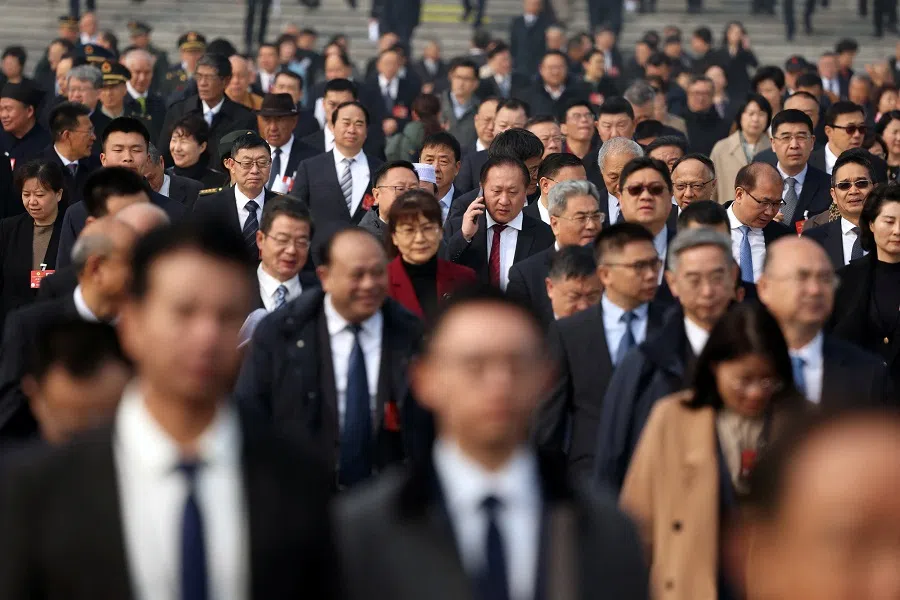
Chow: So you feel that this instability, this contrast in the stability, will actually become a source of tension?
Huang: Nobody knows for sure. So I just want to make sure that we don’t get carried away in our predictions. But one thing that we know from international relations in the past, for example, from the Cold War. The Cold War achieved hyperstability because you had two superpowers, each of them armed with tens of thousands of nuclear weapons and nuclear bombs. So it was a stability achieved by a balance of power and stability within both countries. Soviet Union politics was quite stable, in fact stagnant. In the US, you know, even though they had elections, the main pillars of the American system were quite strong. So the US emerged from the Watergate in the 1970s, and the US Congress implemented a number of political reforms. Carter won the elections, and then Reagan, and then Bush. So essentially, there were policy differences between Carter and Reagan, and between Bush and Clinton, but the main consensus was there. The consensus was very strong, essentially: Democracy, rule of law, open economy, and a role for the government to regulate, but not excessively, to protect the safety of the environment, health, and the workers. So that consensus was there, and respect for the rule of law and democracy. Nobody challenged those principles.
Now we have a situation of a president who openly defied the rule of law, openly defied this core principle that was formed after the end of the Second World War of the importance of global alliances. So the instability is going to be substantial on the American side. Europe can be a source of stability if they get their act together, but, as we know from experience before, European countries have a hard time getting their act together. Maybe this time around they will, because the US has been so unbelievably destructive. It has to force them to get their act together. So then we may see some interesting developments — instability in the US, some stability in Europe, and some stability in China.





